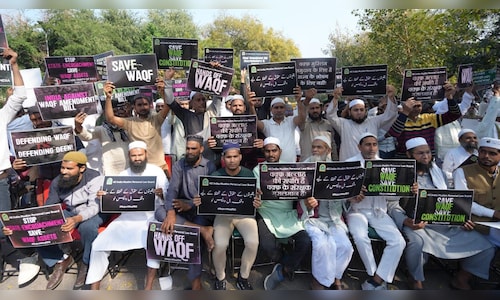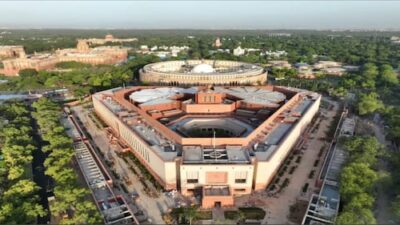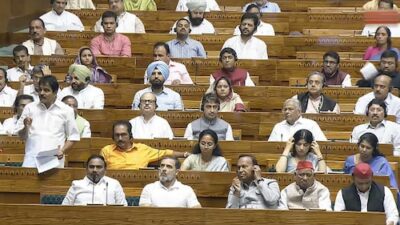What is Waqf land?
Waqf denotes properties allocated for charitable use. Once a property is designated as Waqf, it cannot be reclaimed by the donor. Ownership is transferred, with management overseen by 32 State Waqf Boards.
How much Waqf land is there?
India has approximately 9.4 lakh acres of Waqf land, valued at around ₹1.2 lakh crore. This positions Waqf Boards as the third-largest landowners in India, behind the armed forces and railways.
What are the key changes in the new law?
Changes in the Central Council:
- Previously, only Muslims were part of the Central Waqf Council. It is now mandated to include at least two non-Muslim members.
- Three MPs in the Council can also represent any religion.
Legal Appeals:
- Earlier, decisions made by the Waqf Board and Waqf Tribunal were final.
- Now, these decisions can be contested in the High Court.
Government Property Protection:
- No government property can be classified as Waqf property.
- This regulation will also apply retrospectively.
- In case of disputes, a government-appointed officer will resolve the issues.
Who Can Donate to Waqf:
- Only individuals who have practiced Islam for a minimum of five years can donate property as Waqf.
Ending “Waqf by User”:
- Previously, if a property was utilized for Waqf-related purposes for an extended period, it was automatically deemed Waqf land.
- This provision has now been eliminated.
Removing Section 40:
- Previously, Waqf Boards had the authority to determine if a property was Waqf land.
- This authority has now been revoked.
Reactions to the Bill
The amendments have incited political discussions. Some Muslim organizations and political parties argue that the government seeks to appropriate Muslim-held land. They also criticize the diminished powers of Waqf Boards and the increased government oversight of Waqf properties.
To gauge the implications of these reforms, CNBC-TV18 interviewed Congress spokesperson Bhavya Narasimhamurthy, Wisdom Foundation’s Zeenat Shaukat Ali, and BJP spokesperson Ali Daruwala.
Below are excerpts from the discussion.
Q: The opposition raises concerns that this move is aimed at stripping minority communities of their rights and assets, potentially violating the Constitution. Why is the opposition against this? The government presents the bill as enhancing transparency, citing that “sunlight is the best disinfectant.” What is the opposition’s stance?
Narasimhamurthy: Enhancing transparency in Waqf property management is unrelated to this bill. It’s essential to consider the historical context. We’ve witnessed bulldozer tactics aimed at demonizing the Muslim community, and now they are directly challenging the Constitution of India—the fundamental rights it guarantees every citizen, regardless of their religion. They are initiating changes, beginning with Article 26 and Article 30. Article 26 ensures the right to manage religious affairs, while Article 30 protects minority rights. This Waqf bill fundamentally undermines these constitutional guarantees.
How can one religious authority be governed by individuals of another faith? This is unacceptable. According to this bill, Waqf Boards could be supervised by people of different religions. Which faith would accept this? As a Hindu, I don’t think any religious group would agree to others overseeing their religious matters.
Additionally, the bill imposes restrictions on defining who qualifies as a Muslim. The stipulation that one must have been a practicing Muslim for five years is a clear violation of minority rights for political leverage. We’ve observed how their bulldozer tactics target minorities. Our party has consistently advocated for the constitutional rights of all Indians, irrespective of their faith—be it Muslim, Hindu, Jain, Sikh, or Christian.
Q: Various opposition parties argue that many changes in the bill conflict with the beliefs and practices of the Muslim community, leading to fears of disenfranchisement. How do you respond?
Daruwala: I want to ask the Congress spokesperson who appointed her as the spokesperson for the Muslim community. Congress does not represent us—Muslims have our own identity. During the JPC meetings, we were given ample time to voice our concerns. Twenty-two recommendations were incorporated.
Concerns about having the collector on the board were addressed by replacing the collector with someone of higher authority. The inclusion of non-Muslims on the board did not cause any objection among JPC members; they embraced this change.
Take the Siddhivinayak Temple Trust—the largest congregation in Maharashtra. A Muslim manages the temple in Jejuri. The Tirupati Trust also includes Muslim members. So why the backlash? Why does Congress have an issue when we Muslims do not?
Q: Constitutional experts and opposition leaders question the removal of powers related to land designation. With no government land to be classified as Waqf land, even retrospectively, and the discontinuation of Waqf lands for charitable purposes—like mosques or cemeteries—are we setting the stage for increased litigation and disputes over the management of 9.5 lakh acres of land?
Ali: That is a legitimate concern, and litigation is likely inevitable. In UP, reports indicate that substantial land has already been taken away—claims suggest losses of around 11,000 acres.
Land is an immensely contentious issue worldwide. Conflicts arise over land ownership, as seen in Gaza, where disputes escalate even to the United Nations. So far, consensus has been elusive.
Religion should foster spirituality and unity among people. It ought to cultivate compassion, humility, and care for one another. Unfortunately, the current misuse of religion has fostered distrust, animosity, and suspicion.
Watch the video for more



